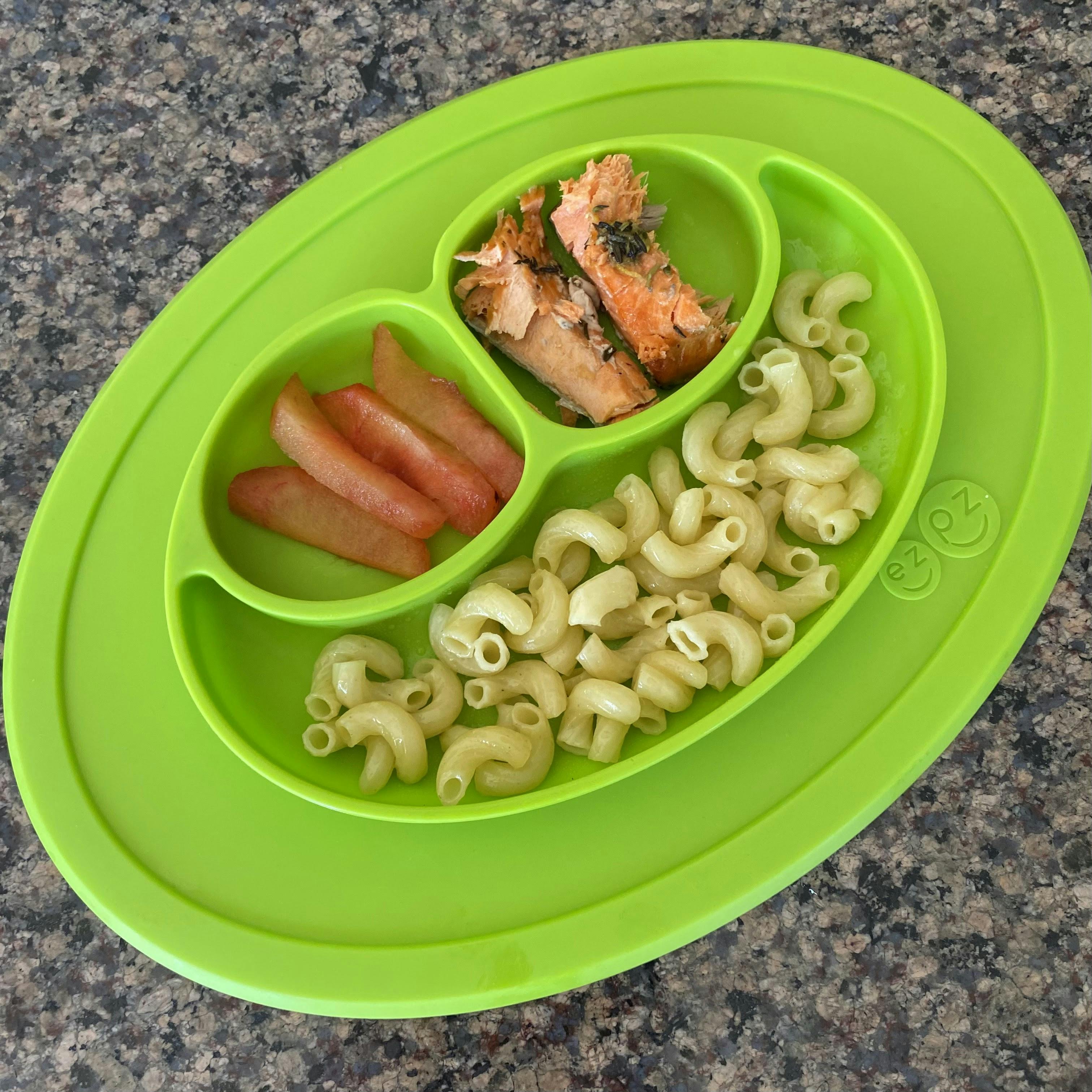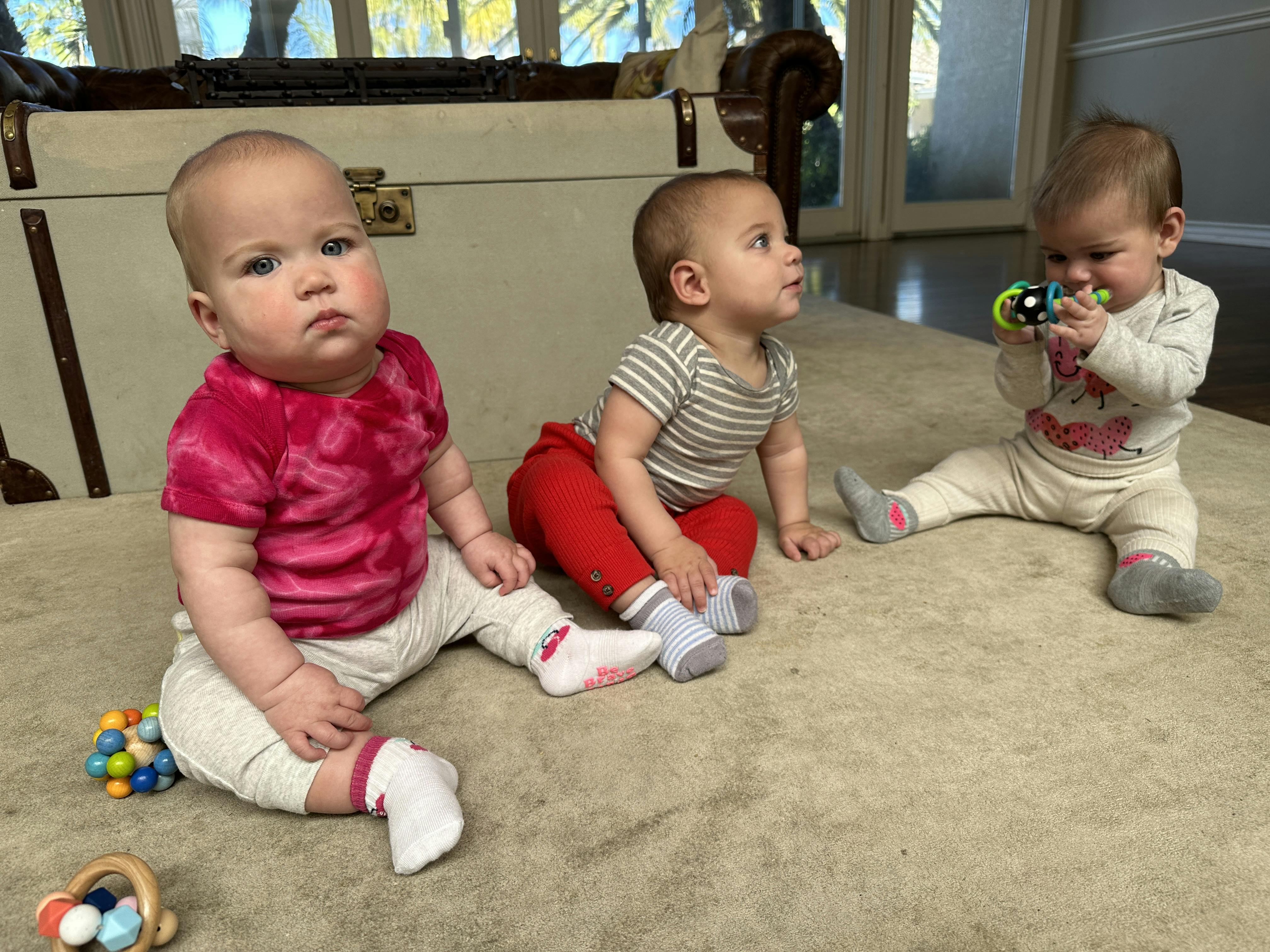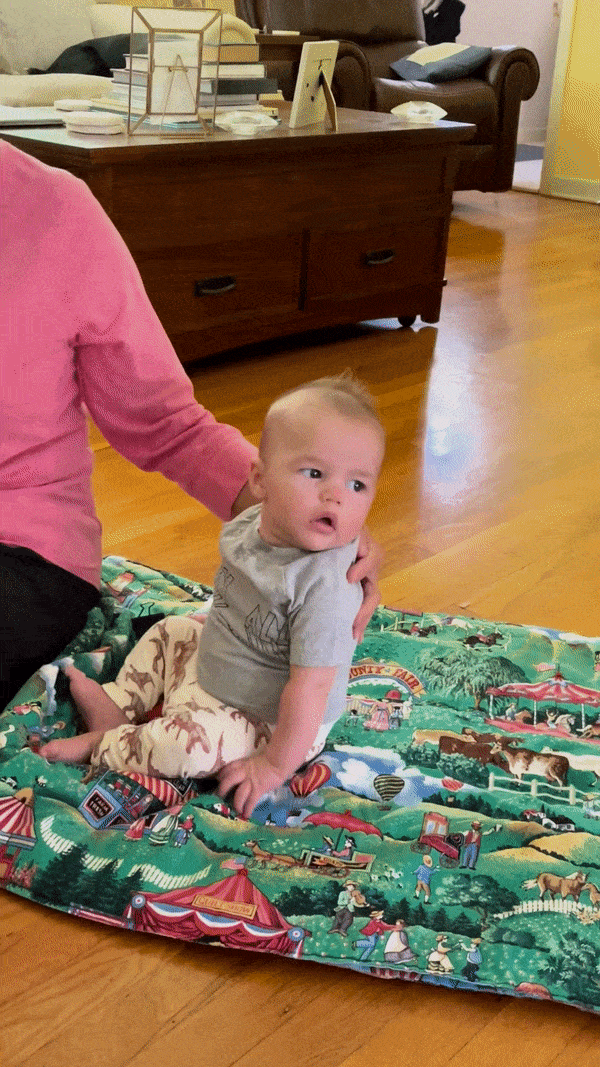Written by Katie Ferraro, MPH, RDN
Disclaimer: The information in this post was written by a dietitian specializing in infant feeding and baby-led weaning. The information in this post is not intended to replace the medical advice of your provider. This is not a sponsored post. This post does contain affiliate links.
When Do Babies Start Eating Solid Food?
Babies are ready to start learning how to eat solid foods somewhere around the 6 month mark.
Prior to 6 months of age, babies consume infant milk for nutrition. Infant milk encompasses breastmilk and/or commercial infant formula.
Infant milk is sufficient to meet your baby’s nutrition needs for the first 6 months of life.
What Are the Reliable Signs of Readiness to Eat?
There are a number of signs that your baby is ready to start solid foods.
Other often-cited signs of readiness to eat include your baby mouthing objects, showing interest in food and foods you are eating and the disappearance of the tongue thrust reflex. Those are not independent signs of readiness but occur alongside being 6 months of age and being able to sit relatively independently.
Alma, 6 months + 2 weeks sitting on her own
Why is it Important to Wait Until 6 Months of Age?
Just because you CAN shove a spoon of food in a 4 or 5 month old baby’s mouth doesn’t mean you SHOULD!
The American Academy of Pediatrics and the World Health Organization as well as other major health bodies all recommend exclusive breastfeeding until 6 months of age.
Breastmilk (and/or formula) is sufficient to meet your baby’s needs for the first 6 months of life. So from a nutritional standpoint, your baby does not NEED anything other than infant milk before 6 months.
If your baby was born prematurely, it is important to use their adjusted age when considering readiness to start solid foods.
For more information on adjusting age for premature babies please listen to this episode of the BABY-LED WEANING MADE EASY podcast called Premature Babies: How to Estimate & Adjust Age for Starting Solids.
Triplets Lorelai, Theodore and Everly - sitting at 7 months adjusted age.
Why is the Ability to Sit Independently so Important?
Your baby being able to sit relatively independently is an important sign of readiness to eat.
From a developmental standpoint, because most babies can’t sit relatively on their own prior to 6 months of age, they do not possess the requisite trunk strength and/or head control to facilitate a safe swallow of foods other than infant milk.
Wherever you’re sitting right now, slump over like a baby who can’t sit up yet.
Now consider that you’ve never had anything in your mouth except breastmilk and/or formula.
In that slumped over position, can you safely swallow a new texture or food?
Of course not!
Jack - 5 months if not ready to eat yet
Physical and Occupational Therapists often cite that proximal stability allows for distal mobility…meaning that if your baby has a stable trunk or core, they’ll be more able to use their hands during feeding.
Another therapist favorite is the saying, “Stability at the hips equals success at the lips.”
Your baby’s stability in sitting is an important precursor for safety at the table.
To learn more about the importance of sitting before starting solid foods please listen to this episode of the BABY-LED WEANING MADE EASY podcast called Postural Support when Starting Solid Foods with Emma Hubbard, Pediatric OT.
What Happens if Solid Foods are Introduced Too Soon?
There are a number of potential consequences to starting solid foods too early.
As addressed above, there is no nutrition requirement for solid food other than infant milk until 6 months of age. This applies to neurotypical, full-term babies.
Medically fragile babies or those with diagnosed metabolic diseases or nutrient deficiencies may have different nutrition requirements and ideally should be followed closely by and working with a pediatric dietitian to ensure adequate nutrition.
Starting solid foods too early also has the potential to increase choking risk if the baby can not sit relatively on their own. Choking incidents early on in feeding can lead to food aversion and food refusal later in the feeding process.
Early introduction of solid foods can negatively impact breastfeeding patterns. Premature introduction of food causes babies to breastfeed less frequently, which in turn decreases mother’s breastfeeding supply and leads to inadequate infant nutrition.
Another area of concern with early introduction of solid foods is increased risk for food allergy. While it is widely understood that offering allergenic foods early and often has the potential to reduce food allergy risk overall, very early introduction of solid foods appears to actually increase overall food allergy risk.
One study published in 2016 found that introducing foods as early as 17 weeks was linked to increased risk of food allergy later in life.
From a common sense standpoint: because there are absolutely no benefits to starting solid foods prior to 6 months, it makes sense to wait until 6 months of age plus when the baby is demonstrating the other reliable signs of readiness to eat before starting solid foods.
Alma, 6 months + 2 weeks is ready to start solid foods
What if the Baby is Ready but Parents Aren’t Ready to Start Solid Foods?
I hear from many parents who admit that their baby is ready to start solid foods…but that the parents aren’t ready yet.
Whether it’s sadness about the eventual cessation of breastfeeding or confusion over which foods to start with first, starting solid foods can be an emotional and overwhelming time for parents and caregivers.
For exclusively breastfeeding mothers, this transition can be exceptionally hard because mom has been the sole source of nutrition for the first 6 months of life.
It can be consoling to know that the weaning period doesn’t happen overnight. Babies don’t wake up on their first birthday and magically know how to eat 100 foods…they need YOU to help them get there.
Breastmilk and/or formula will continue to be an important source of nutrition even after the baby starts solid foods.
It may feel overwhelming to help your baby undertake this transition to solid foods…but it can also help to know that you have a LOT of time to make this happen!
Starting at 6 months of age when you start solid foods, 100% of your baby’s nutrition is coming from infant milk. By the time your baby turns one, they can be getting most of their nutrition from food…so you have 6 whole months to help your baby learn how to eat solid foods safely!
Alma ate 100 foods before turning one
Where Can I Learn More About Safely Starting Solid Foods?
To learn more about how to give your baby a safe start to solid foods and to grab a copy of my original 100 FIRST FOODS LIST, register for the free online video workshop called BABY-LED WEANING FOR BEGINNERS.
Inside of this workshop you will learn:
- How to know if your baby is really ready to start...so you don't start too soon which increases choking risk
- How to safely prepare food for the first 10 days...including high iron foods like meat which can be tricky
- How to introduce allergenic foods to help lower food allergy risk...and what to do if your baby has an allergic reaction
Click here to register for the free BABY-LED WEANING FOR BEGINNERS workshop and grab your copy of my original 100 FIRST FOODS list on this training too.

Offering your baby a variety of foods helps increase diet diversity
If you want more expert guided advice about starting solid foods safely with baby-led weaning, my digital program BABY-LED WEANING with Katie Ferraro can help.
This is my comprehensive step-by-step digital program for starting solid foods safely and navigating the original 100 FIRST FOODS meal plan with baby-led weaning, containing:
- Over 5 hours of concise, self-paced video training
- 100 FIRST FOODS content library and 100 days meal plan
- Over 100 Phase 2 combination food recipes for baby-led weaning
Click here to join the BABY-LED WEANING with Katie Ferraro program.
ABOUT THE AUTHOR
Katie Ferraro, MPH, RDN is a registered dietitian, college nutrition professor and mom of 7. She specializes in baby-led weaning and is the creator of the original 100 FIRST FOODS™ program. Katie hosts the top-rated parenting podcast BABY-LED WEANING MADE EASY and runs the baby-led weaning YouTube channel and @babyledweanteam Instagram account. Her BABY-LED WEANING with Katie Ferrao digital program is the go to resource for exactly how to start solid foods safely with baby-led weaning and to help your baby eat 100 safe, baby-led weaning foods before turning one.

REFERENCES
Fisher, C. B. Motor Development. 3rd ed., Human Kinetics, 2011.
Grimshaw, K. E. C., Bryant, T., Oliver, E. M., Martin, J., Maskell, J., Kemp, T., ... & Ede, R. F. (2016). Incidence and risk factors for food hypersensitivity in UK infants: results from a birth cohort study. Clinical & Experimental Allergy, 46(1), 111-122.
Meek, Joan Younger et al. “Policy Statement: Breastfeeding and the Use of Human Milk.” Pediatrics vol. 150,1 (2022): e2022057988. doi:10.1542/peds.2022-057988
Pérez-Escamilla, Rafael et al. “Breastfeeding: crucially important, but increasingly challenged in a market-driven world.” Lancet (London, England) vol. 401,10375 (2023): 472-485. doi:10.1016/S0140-6736(22)01932-8
Seaver, A. M. Foundations of Pediatric Practice for the Occupational Therapy Assistant. Slack Incorporated, 2017.
World Health Organization. “Infant and young child feeding.” Factsheets, 9 June 2021. https://www.who.int/news-room/fact-sheets/detail/infant-and-young-child-feeding





